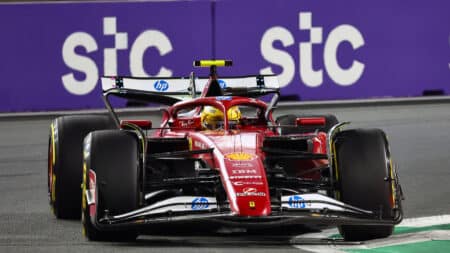
Senna's Lotus 97T: exclusive shoot of F1 legend's first winner
It's 40 years since Ayrton Senna's incredible first F1 win at Estoril – we captured the brilliant grand prix car he did it in for this month's magazine
The International Tribunal hearing into the Mercedes testing case has concluded in Paris after a day of testimony, and it remains to be seen whether a verdict emerges later today or is postponed until tomorrow.
Proceedings began this morning with Mark Howard QC presenting the FIA’s case. Intriguingly, in addition to outlining the breach of Article 22, related to testing a current car, he also mentioned Article 151c, which involves bringing the sport into disrepute, or more specifically bans ‘fraudulent conduct or any act prejudicial to the interests of any competition or to the interests of motorsport generally.’
Howard argued that “without the knowledge, consent and participation of other competitors, Mercedes and Pirelli may have engaged in activity that was prejudicial to the competition.”
In essence he repeated what the FIA said in a media statement on Sunday evening in Monaco, essentially that conversations took place between Mercedes and Charlie Whiting in early May, but Whiting did not formally sanction the Barcelona test with the current car. Howard stressed the FIA’s requirement that other teams be informed and invited.
He said: “Whiting was asked a general and non-specific question – the general question on the permissibility of using a 2013 car. His preliminary response was that such a test would comply with Article 22 providing the purpose was for Pirelli to test its tyre and he would check.”
He added that even though Pirelli has a contract with the FIA which allows for 1000kms tests to be conducted by teams, the Sporting Regulations should take precedence.
Howard also argued that Mercedes had gained some knowledge from the test, saying: “We would suggest that it is difficult to say Mercedes obtained no benefit from the test.”
Speaking on behalf of Mercedes, Paul Harris QC claimed that the team did not break the rules, in essence because the test was arranged and run by Pirelli, and not by Mercedes in its role as a competitor.
The rules state: ‘Track testing shall be considered any track running time not part of an Event undertaken by a competitor entered in the Championship, using cars which conform substantially with the current Formula One Technical Regulations in addition to those from the previous or subsequent year.’
Indeed after talking to both Mercedes team manager Ron Meadows and Ross Brawn on May 3 Whiting had checked with FIA lawyer Sebastian Bernard on the relevance of the phrase ‘undertaken by the competitor’, and was told that if the test was deemed to be undertaken by Pirelli, it could be permissible.
Harris even claimed that Mercedes didn’t have to check with the FIA, given that it was a Pirelli test, claiming that Brawn took a cautious approach.
Harris also argued that if Mercedes is deemed to be in the wrong then the pre-Spanish GP Ferrari test should be considered a breach in that, despite the fact it was done with a two-year-old car, the car did ‘conform substantially with the current Formula 1 technical regulations’, which is what the rules forbid.
Harris also pointed out that the Ferrari test was booked and paid for by the Italian team, and this was in contrast to Pirelli’s arrangements for the Mercedes test.
Intriguingly he also revealed that in 2012 Felipe Massa had taken part in a similar test on Pirelli’s behalf at Barcelona.
Ross Brawn was adamant initially that Mercedes gained no benefit from the test and that Pirelli had not told the team what tyres it was running, although under question he conceded that inevitably there was some benefit.
Meanwhile Pirelli lawyer Dominque Dumas argued that it does not come under the jurisdiction of the FIA as a non-licence holder, citing the 2009 ‘Crashgate’ case – which led to senior team personnel being licensed and thus subject to punishment. Briatore was banned by the FIA, but that was overturned in the French courts.
There’s no clear indication as to which way the International Tribunal will go after a fascinating day of exchanges.

It's 40 years since Ayrton Senna's incredible first F1 win at Estoril – we captured the brilliant grand prix car he did it in for this month's magazine

Twenty-five years ago, the British GP was the subject of a 'prank' by the powers that be as Bernie Ecclestone and Max Mosley made the BRDC hold the race on Easter Sunday. But the chaos that ensued didn't have the desired effect, as Matt Bishop recalls

Lewis Hamilton left Saudi Arabia in a downbeat mood after finishing 30 seconds behind Charles Leclerc. Like in 2024, the Briton is struggling to find answers

The 2025 Saudi Arabian GP delivered a pivotal shake-up in the title battle, as Piastri claimed victory in Jeddah to take the lead the lead in the standings. Here are the main topics from the fifth round of the season